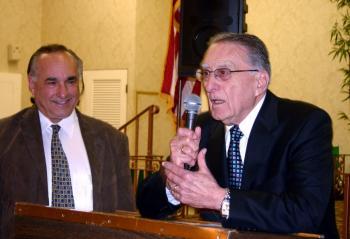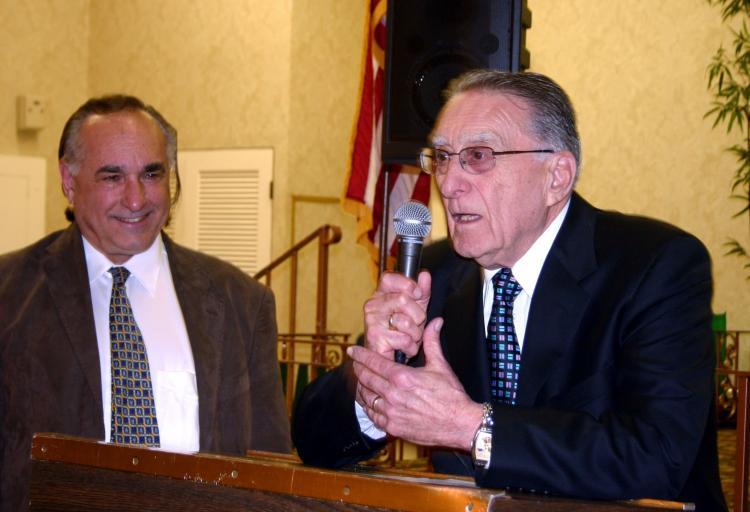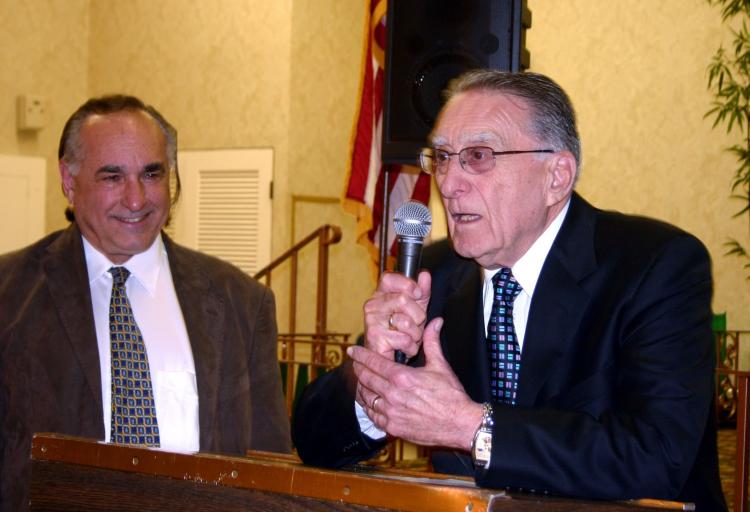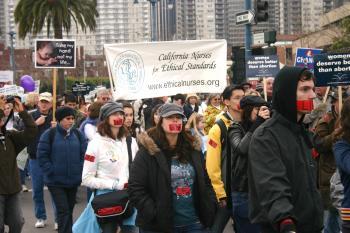SAN JOSE, Calif.—“...against their civil liberty rights ... were arrested and interned. But they didn’t say if you want an attorney? No. Do you want a court date? No. Arrest. Internment,” started Chet Campanella.
If you thought it was the Japanese internment during World War II the retired pharmacist is talking about, you’re only half right. Japanese Americans were certainly subjected to such harsh treatment during World War II, but while the Japanese internment has been popularized in history texts and the media, relatively little is known about the treatment of Italian Americans during the same period.
Out of 400 submissions last year, Campanella’s entry to State Senator Joe Simitian’s There Oughta to be a Law won the contest. Simitian subsequently authored Senate Concurrent Resolution 95, which “acknowledged” and “regretted” the mistreatment of Italian Americans during World War II.
The San Jose resident then testified in Sacramento before a Senate committee. “What struck me was that not a single member of the committee has ever heard about the secret story,” recalled Simitian, referring to traveling restrictions, home searches, property confiscations, job losses, internments, and the like that were applied to Italian Americans.
600,000 Italian immigrants were classified as “enemy aliens.” In California 50,000 Italian Americans were subjected to curfew, house arrest, travel restrictions, and arrests, said Rep. Zoe Lofgren at Una Storia Segreta: An Open Forum presented by the Italian American Heritage Foundation in San Jose.
Lawrence DiStasi, the keynote speaker of the day, author of the book Una Storia Segreta and project director of a traveling exhibit bearing the same name, not only uncovered the secret history of an era in his research, but also discovered surprises of his own. “I found out just last year—my own father was an ‘enemy alien.’ I have never known this. There was nothing ever, ever said.”
“My own uncle was an ‘enemy alien’ during the war. His house was raided. They took his shortwave radio. Not only that, his wife, my Aunt Ruth, was also an ‘enemy alien’ even though she was born in the United States.” Under the Expatriation Act of 1907, an American born woman who married a foreign national becomes a citizen of that foreign nation. “So my aunt, whose family went back to the American Revolution, was characterized as an ‘enemy alien’ during the war, and she was under restriction as well.”
Tony Zerbo, one of the event’s chairpersons, recalled his own father, Vencenzo Zerbo, who came to the U.S. after World War I to work on the railroad and in steel mills, was also classified as an “enemy alien.” “If you didn’t have a citizenship paper, you would be in trouble,” said Zerbo. “They were treated terribly. They were called ‘wops;’ they were called ‘dagos.’ They were called ‘enemies.’ They were very much discriminated.”
While Ronald Reagan and Bill Clinton offered formal apologies to the Japanese Americans in 1988 and 1993 respectively, and each living survivor received $20,000 reparations, the mistreatment of the Italian Americans, German Americans, and American Jews remained unacknowledged for decades.
Determined, DiStasi took the traveling exhibit, Una Storia Segreta, to the Rayburn Office Building in Washington D.C. Campanella and a group of dedicated Italian Americans also wrote numerous letters to three New York Congressmen—Rick Lazio, Alfonse D'Amato, and Eliot Engel—whose legislative sponsorship eventually resulted in the Wartime Violation of Italian American Civil Liberties Act. Signed by President Clinton in 2000, it formally acknowledged the injustices endured by Italian Americans during World War II, even though Italian Americans never got an “apology” from the government.
Simitian’s 2010 bill is a landmark for Italian Americans in California, but why should the state regret what it has done? Wasn’t this really a federal problem? In 1943 the Joint Fact-Finding Committee on Un-American Activities in California issued the Tenney Report. Authored by the then committee chair, Sen. Jack Tenney, Italian Americans were alleged to be un-American. After the U.S. Attorney General pushed the issues aside the following year, however, some members of the State Legislature continued to adhere to the allegations.
“People should have stood up and spoken then. Not many did,” said Simitian. “We all should stand up and speak today.” Why do we talk about something that’s decades in the past now? Understanding what went wrong is a part of preventing what will go wrong in the future, believes Lofgren, who cosponsored the Wartime Violation of Italian American Civil Liberties Act in 1999.
“Those who don’t learn from history are doomed to repeat it,” says Rep. Mike Honda, who also stated that while the scenarios have changed today, the same sentiment still exists towards various immigrant groups.
“History is a teacher of life,” Deputy Consul General of Italy Marcello Curci put it, which “makes it more easy to understand the present, and makes it more easy to bring our future.”
With fewer and fewer survivors left to tell their stories, Campanella, who has already scheduled presentations in a local church and a local school, is determined more than ever to tell his stories.
Una Storia Segreta, which includes photos, artifacts, memorabilia, and historical background, is currently on display at the Dr. Martin Luther King, Jr. Library in downtown San Jose until April 28.
If you thought it was the Japanese internment during World War II the retired pharmacist is talking about, you’re only half right. Japanese Americans were certainly subjected to such harsh treatment during World War II, but while the Japanese internment has been popularized in history texts and the media, relatively little is known about the treatment of Italian Americans during the same period.
Out of 400 submissions last year, Campanella’s entry to State Senator Joe Simitian’s There Oughta to be a Law won the contest. Simitian subsequently authored Senate Concurrent Resolution 95, which “acknowledged” and “regretted” the mistreatment of Italian Americans during World War II.
The San Jose resident then testified in Sacramento before a Senate committee. “What struck me was that not a single member of the committee has ever heard about the secret story,” recalled Simitian, referring to traveling restrictions, home searches, property confiscations, job losses, internments, and the like that were applied to Italian Americans.
600,000 Italian immigrants were classified as “enemy aliens.” In California 50,000 Italian Americans were subjected to curfew, house arrest, travel restrictions, and arrests, said Rep. Zoe Lofgren at Una Storia Segreta: An Open Forum presented by the Italian American Heritage Foundation in San Jose.
Lawrence DiStasi, the keynote speaker of the day, author of the book Una Storia Segreta and project director of a traveling exhibit bearing the same name, not only uncovered the secret history of an era in his research, but also discovered surprises of his own. “I found out just last year—my own father was an ‘enemy alien.’ I have never known this. There was nothing ever, ever said.”
“My own uncle was an ‘enemy alien’ during the war. His house was raided. They took his shortwave radio. Not only that, his wife, my Aunt Ruth, was also an ‘enemy alien’ even though she was born in the United States.” Under the Expatriation Act of 1907, an American born woman who married a foreign national becomes a citizen of that foreign nation. “So my aunt, whose family went back to the American Revolution, was characterized as an ‘enemy alien’ during the war, and she was under restriction as well.”
Tony Zerbo, one of the event’s chairpersons, recalled his own father, Vencenzo Zerbo, who came to the U.S. after World War I to work on the railroad and in steel mills, was also classified as an “enemy alien.” “If you didn’t have a citizenship paper, you would be in trouble,” said Zerbo. “They were treated terribly. They were called ‘wops;’ they were called ‘dagos.’ They were called ‘enemies.’ They were very much discriminated.”
While Ronald Reagan and Bill Clinton offered formal apologies to the Japanese Americans in 1988 and 1993 respectively, and each living survivor received $20,000 reparations, the mistreatment of the Italian Americans, German Americans, and American Jews remained unacknowledged for decades.
Determined, DiStasi took the traveling exhibit, Una Storia Segreta, to the Rayburn Office Building in Washington D.C. Campanella and a group of dedicated Italian Americans also wrote numerous letters to three New York Congressmen—Rick Lazio, Alfonse D'Amato, and Eliot Engel—whose legislative sponsorship eventually resulted in the Wartime Violation of Italian American Civil Liberties Act. Signed by President Clinton in 2000, it formally acknowledged the injustices endured by Italian Americans during World War II, even though Italian Americans never got an “apology” from the government.
Simitian’s 2010 bill is a landmark for Italian Americans in California, but why should the state regret what it has done? Wasn’t this really a federal problem? In 1943 the Joint Fact-Finding Committee on Un-American Activities in California issued the Tenney Report. Authored by the then committee chair, Sen. Jack Tenney, Italian Americans were alleged to be un-American. After the U.S. Attorney General pushed the issues aside the following year, however, some members of the State Legislature continued to adhere to the allegations.
“People should have stood up and spoken then. Not many did,” said Simitian. “We all should stand up and speak today.” Why do we talk about something that’s decades in the past now? Understanding what went wrong is a part of preventing what will go wrong in the future, believes Lofgren, who cosponsored the Wartime Violation of Italian American Civil Liberties Act in 1999.
“Those who don’t learn from history are doomed to repeat it,” says Rep. Mike Honda, who also stated that while the scenarios have changed today, the same sentiment still exists towards various immigrant groups.
“History is a teacher of life,” Deputy Consul General of Italy Marcello Curci put it, which “makes it more easy to understand the present, and makes it more easy to bring our future.”
With fewer and fewer survivors left to tell their stories, Campanella, who has already scheduled presentations in a local church and a local school, is determined more than ever to tell his stories.
Una Storia Segreta, which includes photos, artifacts, memorabilia, and historical background, is currently on display at the Dr. Martin Luther King, Jr. Library in downtown San Jose until April 28.





